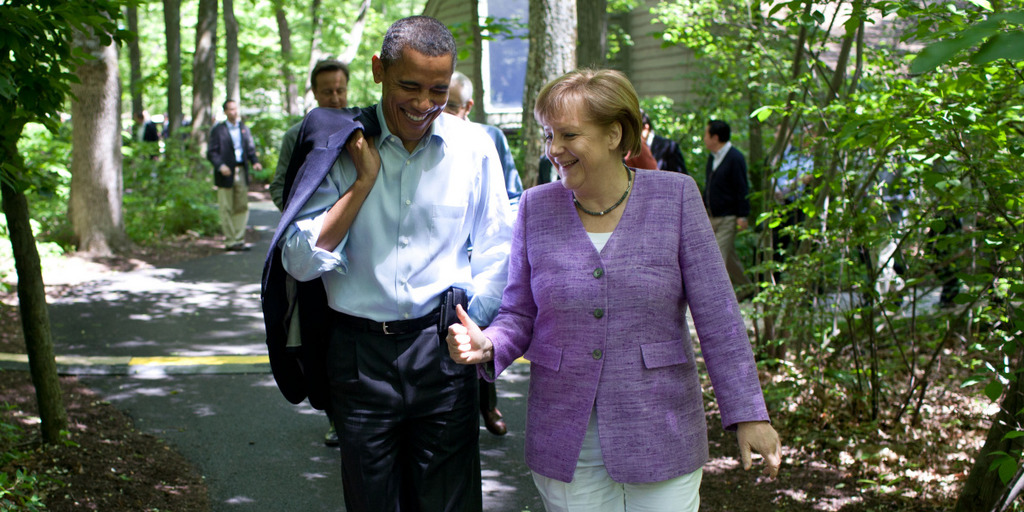On the eve of the 70th anniversary of the end of World War II, large majorities in both countries (72 percent of Americans and 62 percent of Germans) expressed trust in the bilateral alliance, a finding that contradicts the widespread perception of a relationship in crisis. The poll shows that while skepticism (especially in Germany) exists, support for the US-German partnership as such remains firm.
Despite the discord created by last year’s revelations of NSA surveillance activities of Chancellor Angela Merkel, a majority of Germans (59 percent) strongly approves of the way President Barack Obama handles the bilateral relationship. An even higher number of Germans (71 percent) approves of the job Merkel is doing. Americans give the leaders of both countries much less credit: 40 percent approve of Obama’s handling of ties with Berlin, and 38 percent approve of the Merkel’s stewardship of relations with Washington. Nearly a quarter (23 percent) have no opinion.
Both sides differ on the approach towards Russia, with 59 percent of Americans believing that the EU’s policy toward Russia on the issue of Ukraine is not tough enough, while 62 percent of Germans believe that the current actions are too strong (18 percent) or about right (44 percent). A majority of Germans (57 percent) nevertheless believes it is more important for Germany to have strong ties with the US than with Russia.
These are among the main findings of two parallel telephone surveys conducted among 963 people in Germany from February 24 to February 25, 2015, and among 1,003 people in the United States from February 26 to March 1, 2015. Among the other findings:

© Official White House Photo by Pete Souza
Germany and the United States: Reliable Allies
Germans and Americans overwhelmingly see one another as reliable allies – despite different views on Russia, global leadership and trade. This is the result of a new survey by the Pew Research Center in association with the Bertelsmann Foundation.
Germans increasingly sceptical about TTIP
Trade and Investment: Perceptions differ widely when it comes to deepening economic ties. Just 41 percent of Germans think that a US-European free trade agreement, the Transatlantic Trade and Investment Partnership (TTIP), would be good for Germany – a drop by 14 percentage points since a previous Pew Research Center survey in February-March 2014. The American position remains largely unchanged from 2014 with half (50 percent) of the public in support of an agreement with the EU. However, as with Germans, much of the public is undecided.
Global Leadership: Half of both the German and the American public prefer to focus on domestic issues rather than assume greater international obligations. The younger generation is the most inward looking: More than half of both Americans (57 percent) and Germans (54 percent) between 18 and 29 hold the view that their country should deal with its own problems. Attitudes differ on Germany’s role in the world. More than half of Americans (54 percent) think Berlin should play a more active military role in maintaining worldwide peace and stability, while only 25 percent of Germans agree.
Reliable Allies: While majorities in the US and in Germany view the other side as reliable allies, they each place more trust in another EU and NATO partner. 85 percent of Americans view Britain as dependable, and more than three-quarters of Germans (78 percent) see France that way.
East Germans put less importance on ties with the US
The Role of History: Different historical events feature prominently in Americans’ and Germans’ consciousness. To nearly half of Americans (47 percent), World War II and the Holocaust are the most defining events in the US-German relationship. A plurality of Germans (34 percent), on the other hand, sees the defining event as the fall of the Berlin Wall.
East-West Divide in Germany: The legacy of the Cold War continues to shape perceptions in Germany. East Germans (44 percent) are less likely than West Germans (61 percent) to prioritize close ties with the US over close ties with Russia. They are also far more likely (60 percent) than their fellow countrymen in the West (47 percent) to voice the view that Germany should deal with its own problems and let other countries deal with theirs.
Partisan Divide in the US: Partisan politics colors Americans’ views of the trans-Atlantic relationship. Democrats (67 percent) are far more likely than Republicans (16 percent) to approve of President Obama’s handling of Washington-Berlin ties. Nearly seven-in-ten Republicans (69 percent) say the United States is not being tough enough on Russia over Ukraine; only 47 percent of Democrats agree.



